Piggy-back solution a burden on ratepayer

Like most of us, Andrew Emdon, 68, has been hard hit by Covid-19 and the subsequent lockdown.
The Three Anchor Bay resident is a freelance videographer and has “had zero income” since the lockdown began on March 26.
Imagine his shock and anger when he went to buy electricity and only received about 40 units for R300. He usually gets 250 units for the amount of money and said the reduced units would only last their household two days at the most.
“I am appalled at the way the City of Cape Town is deducting rates arrears. I feel this is a dirty tactic as there was no warning, especially in winter and during this period where we are all trying to weather the pandemic storm. I have faithfully paid my rates for the full 22 years I have had this property. I have applied for indigent relief.
“Hopefully this will work. But my point is the lack of warning and the disgusting extraction of money in this vulnerable time,” Mr Emdon said.
So what happened? Mayoral committee member for finance, Ian Neilson, said that a warning letter was sent on August 1 (2018) for arrears of R13 401.20.
“The arrears were settled and the account was up to date. The account went into arrears again, as the last payment was received on March 16 2020. Due to the above default history, the account was loaded on our prepaid deduction system for municipal debt and the deduction was systematically initiated when the account was in arrears again,” Mr Neilson said.
The account’s arrears amount is now at R5 236.34 which must be paid before the deductions can be suspended.
The City is currently deducting the minimum amount of 71% based on his municipal property valuation.
“Municipal debt was deducted via the electricity prepaid vending system in accordance with the City’s Credit Control and Debt Collection Policy. If the accounts are not settled after the due date, appropriate debt collection actions must be taken. In terms of relevant legislation, the City has to send out invoices advising the debtor of their liability.
“The initial debt recovery step taken is the issuing of warning letters, or letters of demand, advising the property owners/users of services of the imminent restriction, or disconnection of services.
“If no responses are received or the debt outstanding is not settled even after the warning notices have been served, the next step in terms of legislation is to either disconnect the electricity supply, restrict to a trickle-flow the water supply or recover the debt through electricity prepaid deduction.
“Most people at this stage, come into our offices to either settle their accounts in full, or make arrangements to pay off their debts over an agreed period of time and based on their ability to pay,” Mr Neilson said.
For further deductions, the City does not warn residents again as the process is system driven to collect when it is in arrears which was explained in the letter sent in 2018.
“The City first sends the letter warning the debtor of the impending action and if an arrangement is made, the City will not collect via prepaid meter.
“Account holders who have arrangements and keep to the terms are also not affected by further deductions.
“This will only affect those who ignore our warning letters or those who do not keep to the terms of the arrangements. Mr Emdon is a sporadic payer as detailed in his history,” Mr Neilson said.
Mr Emdon may qualify for indigent relief if his total household income is R7 000 a month or less; he may also qualify for an applicable rates rebate, depending on his income bracket, if his total household income is R17 500 per month or less; or if he is a senior citizen.
“If he does not qualify for relief,” Mr Neilson said, “Mr Emdon can enter into a payment arrangement to pay off the arrears over an agreed number of months. No interest will be charged for the duration of the arrangement, provided it is honoured. He can send his request to COVID19.Relief@capetown.gov.za or SMS to 48043.
“The City always engages with residents to try and prevent debt management actions, by encouraging them to enter into an affordable payment arrangement with the City or register as indigent where applicable,” said Mr Neilson, who added that the City has communicated with Mr Emdon by email.
However, Mr Emdon pointed out that in 2018 the R13 401.20 debt was an entirely separate issue.
“There was a water leakage on my property of which I was unaware and I was forced to pay this huge penalty during the drought. The case was delayed because of an investigation by the City’s ombudsman, which I lost. Also a very unfair issue, which we had to resolve.
“Meanwhile I am coming to an arrangement with council now. They are giving me a a discounted payment arrangement. Hopefully this will end my woes,” Mr Emdon said.